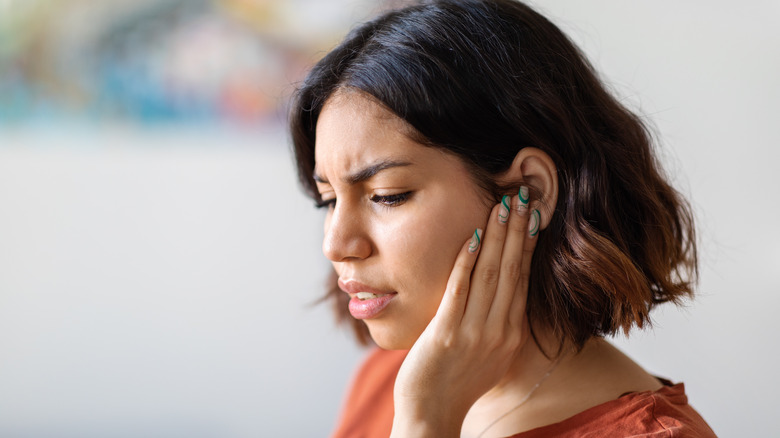Unusual COVID Symptoms You May Not Have Heard Of
COVID-19 is surging again, even though protocols such as isolation and mask mandates have significantly changed since 2020. The virus itself continues to evolve, and the Association of American Medical Colleges says the current variants are highly contagious. Many of the COVID symptoms haven't changed since the original variant in 2020. Most people today report flu-like symptoms such as fever, cough, sore throat, fatigue, and congestion because it's a respiratory infection.
COVID's effects aren't just limited to the respiratory tract, however. A 2024 review in Medicina tracked serious COVID cases that affected other organs of the body and required hospitalization. Some people experienced reduced blood flow to their intestines, gastrointestinal bleeding, and liver damage. Others suffered from strokes and brain inflammation while some people suffered from acute kidney failure. COVID-19 can also cause heart damage, irregular heartbeat, or blood clotting problems.
COVID can also manifest in other ways that you might not expect. In an exclusive interview with Health Digest, Dr. Jason Singh, who is Chief Medical Officer and Physician at One Oak Medical, explained some of the more unusual ways that COVID can affect your body.
COVID might cause a change in your menstrual cycle
Singh said some people could see heavier or lighter periods as a symptom of COVID-19. "It is thought to be related to the virus temporarily causing hormonal imbalances, affecting estrogen and progesterone levels, which in turn can disrupt the menstrual cycle," he explained.
These changes can be variable although certain patterns are more common. According to a 2022 systematic review in the Journal of Clinical Medicine that included three studies, women experienced changes in both the amount of their menstrual bleeding and their menstrual cycle length. However, the latter effect was the most common. Additionally, most women reported having lighter periods and longer cycles. These changes did not appear to be affected by the severity of their infections.
"While these changes are temporary, I encourage patients to maintain good hydration and consume a balanced diet rich in iron and vitamins that are important substrates and precursors for hormonal balance," Singh added.
Discolored toes can be a symptom of COVID
COVID symptoms usually target the upper half of your body, but don't ignore your toes as a possible location."Reddish-purple discoloration or swelling of toes can also happen which we call 'COVID toes' and sometimes it is accompanied by pain and itching," Singh said. Nebraska Medicine adds that some people might have blister-like bumps, and COVID toes are more common in children or young adults. (Read how COVID toes exposed a lack of diversity in dermatology photos.)
Although Singh says most cases of COVID toes go away after four to six weeks, a 35-year-old woman featured in a 2023 case study in Cureus had black lesions on her toes that didn't go away until six months later. Researchers believe COVID-19 toes might have to do with spike proteins in the COVID virus that bind to sweat glands and blood vessels in your toes and fingers. People who get COVID toes months after their initial COVID infection could have tiny blood clots in the small blood vessels in their toes, which leads to swelling. Younger people with COVID toes could experience this symptom earlier because their immune responses kick in earlier than those of older adults.
COVID can also cause brain fog
As you recover from COVID, you might experience problems with concentration and memory. Singh says it's still unknown what might cause COVID-related brain fog, but some believe the virus could cause inflammation of the brain. A 2022 article in the Journal of Health Service Psychology suggested that sleep problems and mental health disorders might also contribute to long-COVID brain fog.
The article highlighted the case of a 35-year-old nurse who complained of brain fog three months after her COVID diagnosis. She had problems recalling conversations, and her fatigue made it difficult for her to perform efficiently at work. She had problems sleeping partially due to coughing at night. Although her depression was previously under control, she began experiencing anxiety and depression and gained 30 pounds after her COVID infection.
Your doctor can determine if your brain fog is COVID-related by evaluating your cognitive health, checking for sleep or psychological disorders, and noting any lifestyle practices and comorbidities that could contribute to neuroinflammation. "I typically suggest activities that promote cognitive function such as puzzles or learning new skills, getting good sleep, and vigorous physical activity for better blood circulation to the brain," Singh said.
Tinnitus could mean long COVID
When you have a bad cold, sometimes your ears might feel clogged and your hearing could change. Tinnitus is a condition where you hear ringing or other sounds that aren't caused by an external source. According to the Cleveland Clinic, people with tinnitus could feel their condition worsen if they have COVID. Singh says you could develop tinnitus after you've been infected with COVID.
Tinnitus, vertigo, and dizziness are pretty common if you have long COVID, according to a 2022 article in Frontiers in Neurology. Out of 1,000 people with long COVID in Germany, 60% of them said they had vertigo or dizziness, and 30% said they experienced tinnitus.
Cleveland Clinic says that therapeutic sounds like a fan, ambient soundscapes, or nature sounds could alleviate tinnitus, but an audiologist can determine the cause. COVID might not necessarily have been the cause of your tinnitus but it may have made you aware of this symptom. Too much earwax, age-related hearing loss, and TMJ issues are just a few conditions that could also cause tinnitus.
COVID could make things smell different
"Although it's common to lose [your sense of] smell in COVID-19, we're also noticing familiar odors becoming distorted," Singh said. This condition is known as "parosmia." If you have parosmia, your beloved cup of coffee could smell like garbage, according to the University of Utah Health. You could experience parosmia when you've recovered from COVID, sometimes three to four months later.
According to a 2020 study in JAMA Otolaryngology-Head & Neck Surgery, COVID can affect your sense of smell in two ways. The virus can block the nasal passage that processes smells, or it can damage nerves that sense smells. If you're experiencing post-COVID parosmia, the University of Utah Health says 65% of people will see their sense of smell return to normal about 18 months after their COVID infection.
In the meantime, eating bland meals at cold or room temperature can reduce any triggers of parosmia. Complex aromas and steamed foods can feel disruptive. "I recommend smell training which involves repeatedly smelling a set of distinct odors like lemon, cloves, [and] eucalyptus for short periods each day to better calibrate your sense of smell," Singh said.






